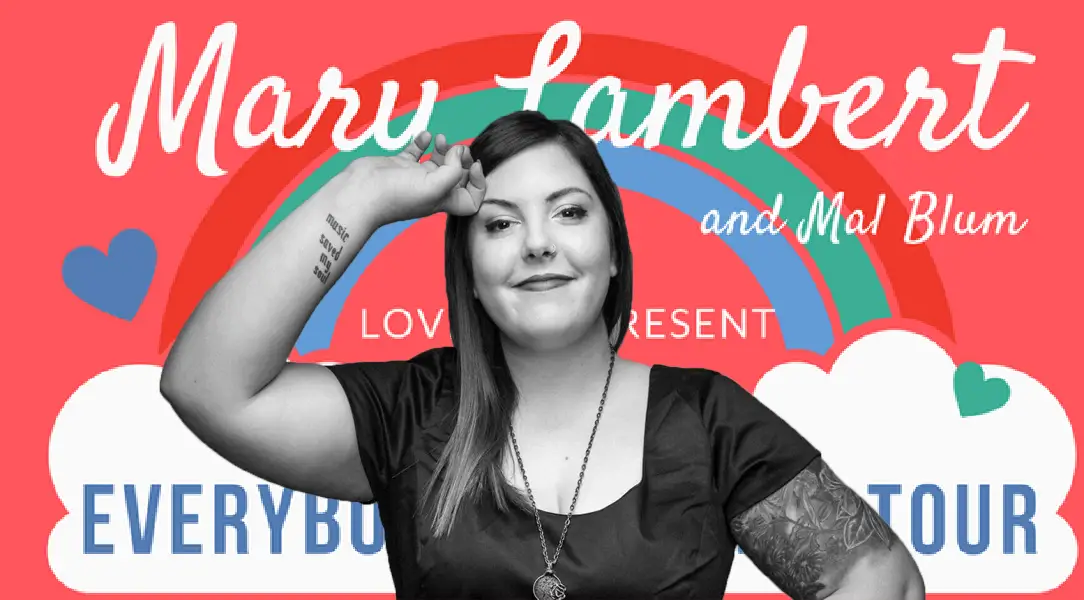[dropcap size=big]I[/dropcap] never expected to see a female artist sing about being gay in the basement of a church when I went to religion class as a kid. Mary Lambert played the 9th Ward at Babeville in Buffalo, New York during the second week of June, and it was a bananas good show for a lot of reasons.
The setting
It’s an impromptu space made for shows to feel like gatherings rather than just performances.
To start, the 9th Ward is a small space, and it makes for incredibly intimate shows. The stage is elevated but not much, and there’s a bar right in the back, serving beer in plastic cups. It’s not made to be anything more than it is, and it works well when complimented by artists who are willing to have a relationship with the audience. In a lot of ways, it does feel dingy, but that’s also balanced by room to breathe. In many ways, it feels like we all wandered down there after hearing music playing from outside the church, going down the stairs unsure of what we’d find. It’s an impromptu space made for shows to feel like gatherings rather than just performances.
My roommates and I stood by the back wall, resting arms and cups on the shelf made for exactly those purposes. My hand was stamped as I came in, and one of my roommates had already purchased a poster with the lyrics from Lambert’s “Body Love” (more on that later). Mal Blum took the stage, opening for Lambert.
The singers
Blum sings a lot about their experience of mental health issues. They’re very honest and often self-deprecating. The audience clearly felt the same about themselves, and to be honest, Blum was the reason I’d purchased tickets in the first place, not really knowing what Lambert was about. It was a short opener, and from where I was standing, I could see Mary Lambert poking her head out, clearly having become friends with the other artists over the course of their tour.
Then, after a quick break and a stop once more at the merchandise table, Lambert came on stage. The lights dimmed, and she began in a very friendly manner, joking with the audience, thanking us for coming – all good show etiquette. Yet, as she began “Secrets,” I couldn’t tell at first if the show had started until she started to play the piano.
More than that, however, was the tone in the room: a mixture of honesty and proximity.
Mary Lambert is very honest about her own issues with her body and the way that society contributes to them as well as being open about her sexuality. And, of course, the intersection of the two. She would stop between songs to tell stories about living in New York and working to make ends meet by waitressing. She addressed leaving her record label and producing her own album. It was easy, conversational. Lambert responded to audience call-outs kindly, at one point encouraging those in relationships to dance together and those not to dance with each other.
More than that, however, was the tone in the room: a mixture of honesty and proximity. It wasn’t claustrophobic; rather, it was communal building. From the back, I was able to observe expressions of affection between humans of all genders. There was an energy in the room that I think is especially important when hosting artists who speak in a real way.
The effect
A small venue doesn’t allow for a large audience; that’s self-evident. They also make it hard for an artist to hide behind distance, and added to that, both Blum and Lambert spoke directly to their experience. They weren’t trying to hide, and the emotion behind each song was palpable, whether or not that song had to do specifically with an issue they’d mentioned.
They also make it hard for an artist to hide behind distance, and added to that, both Blum and Lambert spoke directly to their experience.
There’s nothing wrong with larger shows at larger venues, they’re just a different sort of animal entirely. The focus there is on the music rather than necessarily the musician. Likewise, that allows the connection to be forged through the songs. One is not better than the other; it’s based simply on preference.
The 9th Ward – and other small venues – hold a special place of importance. They provide a unique space, one often with a story, and only allow a select few to wander in at one time. And then they give us a host and a moment. Musical hospitality at its finest.




